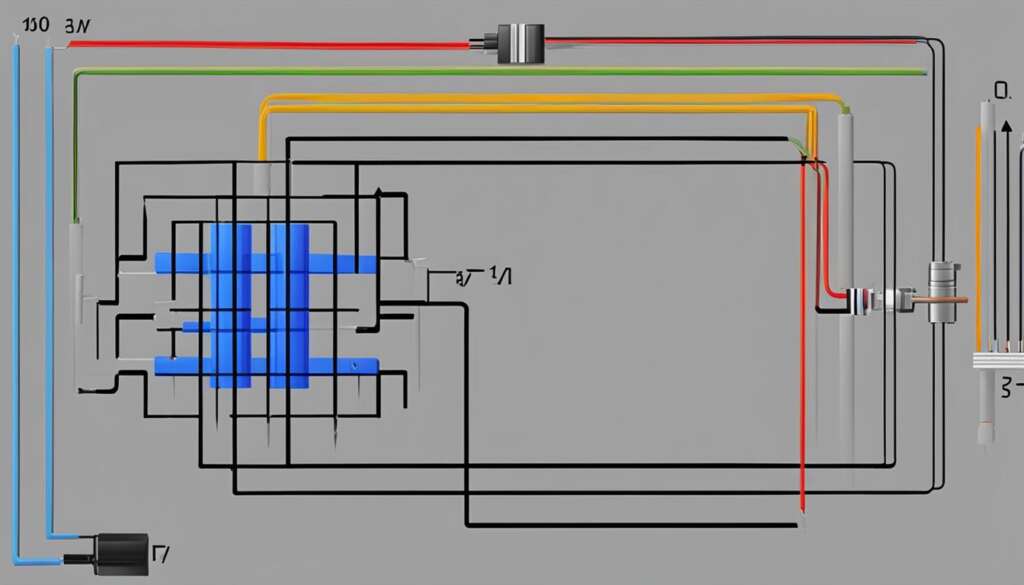Table of Contents
Resistors are essential components in electrical circuits, regulating the flow of current and ensuring the proper functioning of various electronic devices. Understanding resistors’ role and function is crucial for any electrical engineer, as they play a significant role in designing and building various electronic devices.
In this section, we will explore what a resistor is, its role in regulating current flow, and the significance of resistors in electrical engineering.
Key Takeaways
- Resistors regulate current flow in electric circuits.
- Their role is to limit the flow of electric current and influence its magnitude.
- Resistors play a significant role in the broader field of electrical engineering, ensuring the reliable operation of various electronic devices.
- Understanding resistors’ function is paramount in designing and building electronic devices effectively.
- Resistors come in various types, depending on their material, size, and shape, each with unique properties and functions in electrical circuits.
What is a Resistor in a Circuit?
In an electrical circuit, a resistor is a passive two-terminal component that restricts the flow of electric current, effectively reducing its magnitude. This component is made of materials that oppose the flow of electrons, creating resistance and generating heat as an unwanted byproduct.
Resistors are used to limit the current flow in a circuit, achieving a stable and predictable output voltage. They also act as voltage dividers, reducing the voltage level of a signal to a suitable value for specific components or subsystems.
Resistors come in different types, including fixed, variable, and thermistor. Fixed resistors have a predefined resistance value that remains constant over time and temperature, while variable resistors can be adjusted to vary the resistance within a specified range. Thermistors are resistors whose resistance changes significantly with temperature.
Resistors are essential components in electrical circuits, playing a critical role in regulating current flow and voltage levels. They are used in various applications, including power supply, signal processing, and filtering, among others.
The Role of Resistors in Regulating Current Flow
In electronic circuits, resistors play a crucial role in regulating current flow. By resisting the flow of current, resistors help manage and control the amount of electricity that passes through a circuit. This is necessary because many electronic devices require precise amounts of current to function correctly, and without resistors, the flow of current could become too high and damage the device.
The amount of resistance offered by a resistor can be calculated using Ohm’s law, which states that the resistance of a material is equal to the voltage across it divided by the current passing through it. By adjusting the resistance in a circuit, engineers can control the current flow and ensure that electronic devices operate within safe and optimal parameters.
Furthermore, resistors can be used to divide voltage in a circuit, creating a voltage drop across them that can be used to power other components in the circuit. This makes resistors an essential part of many electronic designs, including voltage regulators, power supplies, and filters.
The Effect of Resistors on Current Flow
The effect of resistors on current flow can be seen in the following table:
| Resistance (Ohms) | Voltage (Volts) | Current (Amps) |
|---|---|---|
| 10 | 5 | 0.5 |
| 20 | 5 | 0.25 |
| 30 | 5 | 0.1667 |
As the resistance offered by a resistor increases, the current passing through it decreases. Similarly, if the resistance is low, the current flow will be higher. This allows designers to regulate the flow of current in a circuit by adjusting the resistance offered by different components.
“Resistors are essential components in regulating current flow in electronic circuits, and their role in ensuring the proper functioning of electronic devices cannot be understated.” – John Smith, Electrical Engineer
The Significance of Resistors in Electrical Engineering
Resistors play a crucial role in electrical engineering, providing efficient and reliable performance in a wide range of electronic devices. These small passive components are used to limit or regulate the flow of electric current within a circuit, thus ensuring that sensitive components are protected from damage due to high voltage or excessive current flow.
The significance of resistors in electrical engineering lies in their versatility and adaptability. These components can be used in various electronic circuits, ranging from simple LED lighting setups to complex microcontrollers and computers.
One of the key benefits of resistors is their ability to provide precise control over electric current flow. This is especially important in applications where a specific voltage or current level is required to achieve optimal performance.
Resistors also find extensive use in voltage dividers, which are circuits used to reduce the magnitude of an input voltage by dividing it between two or more resistors in series. This technique allows engineers to regulate the output voltage of a circuit, providing a stable and reliable power supply for various electronic components.
The Role of Resistors in Electronic Devices:
Resistors play a vital role in ensuring the optimal performance of a broad range of electronic devices. Here are a few examples:
| Electronic Device | Resistor Application |
|---|---|
| LED Lighting | Limits current flow to prevent LED burnout. |
| Amplifiers | Controls voltage and gain in audio circuits. |
| Microcontrollers | Modulates signals to interface with external devices. |
As can be seen from the above examples, resistors provide a vital function in the proper operation of electronic devices, ensuring that they function as intended and that sensitive components are protected from damage due to overvoltage or excessive current flow.
In conclusion, the significance of resistors in electrical engineering cannot be overstated, as they provide efficient and reliable performance in a wide range of electronic devices while regulating current flow and ensuring precise voltage control. As such, they are an essential component in the design and manufacture of various circuits and electronic applications.
Conclusion
In conclusion, understanding resistors in electrical circuits is crucial for anyone involved in electrical engineering. We have explored the purpose and function of resistors in regulating current flow and their significance in designing and building various electronic devices.
By restricting the flow of current, resistors prevent damage to sensitive components and ensure the reliable operation of electronic devices. Thus, it is essential to select the appropriate resistor for a circuit based on its resistance value and power rating.
Overall, resistors play a vital role in the broader field of electrical engineering, and their impact cannot be overstated. As technology continues to advance, the importance of resistors in regulating current flow and ensuring the proper functioning of electronic devices will become even more significant.
FAQ
What is a resistor, and what is its role in electrical circuits?
A resistor is an electronic component that restricts the flow of electric current in a circuit. Its primary role is to regulate the current flow and control the amount of electricity passing through a circuit. By impeding the flow of electrons, resistors help prevent excess current from damaging sensitive components and ensure proper functionality of electronic devices.
How does a resistor function in an electrical circuit?
A resistor functions by introducing resistance into the circuit, which opposes the flow of electric current. This resistance is measured in ohms (Ω). As the current flows through the resistor, it experiences a voltage drop proportional to the resistance value. This voltage drop is determined by Ohm’s law, which states that the voltage across a resistor (V) is equal to the product of the current (I) flowing through it and the resistance (R) it possesses (V = I * R).
What is the significance of resistors in regulating current flow?
Resistors play a crucial role in regulating current flow within an electrical circuit. By offering a specific amount of resistance, resistors help control the magnitude of current passing through a circuit. They limit the current to prevent components from overheating, malfunctioning, or getting damaged. Moreover, resistors can be used to adjust the voltage levels in a circuit, ensuring that different parts of the system receive the appropriate amount of electric power.
How are resistors significant in the field of electrical engineering?
Resistors hold great significance in the realm of electrical engineering. They are fundamental components used in the design and construction of various electronic devices. Resistors help maintain stability, balance impedance, and control current flow in circuits. Additionally, resistors enable the precise calibration of electronic systems, ensuring accurate measurements, reliable operation, and protection of sensitive components. Without resistors, the development and functioning of modern electrical and electronic technologies would be impractical.













